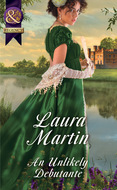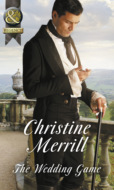Książki nie można pobrać jako pliku, ale można ją czytać w naszej aplikacji lub online na stronie.
Czytaj książkę: «The Governess's Scandalous Marriage»
A ruined governess
And a marriage born of scandal!
When penniless Linnet Osborne takes a job as a governess, she’s shocked to discover her new employer is none other than Christian, Lord Blakely! They’d once shared a passionate embrace that almost forced them to marry. Christian is no less compelling now—so much so that Linnet is tempted to explore beyond those fleeting kisses... But that would mean they’d have to wed!
HELEN DICKSON was born and still lives in South Yorkshire, with her retired farm manager husband. Having moved out of the busy farmhouse where she raised their two sons, she now has more time to indulge in her favourite pastimes. She enjoys being outdoors, travelling, reading and music. An incurable romantic, she writes for pleasure. It was a love of history that drove her to writing historical fiction.
Also by Helen Dickson
The Master of Stonegrave Hall
Mishap Marriage
A Traitor’s Touch
Caught in Scandal’s Storm
Lucy Lane and the Lieutenant
Lord Lansbury’s Christmas Wedding
Royalist on the Run
The Foundling Bride
Carrying the Gentleman’s Secret
A Vow for an Heiress
Discover more at millsandboon.co.uk.
The Governess’s Scandalous Marriage
Helen Dickson

ISBN: 978-1-474-08927-2
THE GOVERNESS’S SCANDALOUS MARRIAGE
© 2019 Helen Dickson
Published in Great Britain 2019
by Mills & Boon, an imprint of HarperCollins Publishers 1 London Bridge Street, London, SE1 9GF
All rights reserved including the right of reproduction in whole or in part in any form. This edition is published by arrangement with Harlequin Books S.A.
This is a work of fiction. Names, characters, places, locations and incidents are purely fictional and bear no relationship to any real life individuals, living or dead, or to any actual places, business establishments, locations, events or incidents. Any resemblance is entirely coincidental.
By payment of the required fees, you are granted the non-exclusive, non-transferable right and licence to download and install this e-book on your personal computer, tablet computer, smart phone or other electronic reading device only (each a “Licensed Device”) and to access, display and read the text of this e-book on-screen on your Licensed Device. Except to the extent any of these acts shall be permitted pursuant to any mandatory provision of applicable law but no further, no part of this e-book or its text or images may be reproduced, transmitted, distributed, translated, converted or adapted for use on another file format, communicated to the public, downloaded, decompiled, reverse engineered, or stored in or introduced into any information storage and retrieval system, in any form or by any means, whether electronic or mechanical, now known or hereinafter invented, without the express written permission of publisher.
® and ™ are trademarks owned and used by the trademark owner and/or its licensee. Trademarks marked with ® are registered with the United Kingdom Patent Office and/or the Office for Harmonisation in the Internal Market and in other countries.
Version: 2020-03-02
MILLS & BOON
Before you start reading, why not sign up?
Thank you for downloading this Mills & Boon book. If you want to hear about exclusive discounts, special offers and competitions, sign up to our email newsletter today!
Or simply visit
Mills & Boon emails are completely free to receive and you can unsubscribe at any time via the link in any email we send you.
Note to Readers
This ebook contains the following accessibility features which, if supported by your device, can be accessed via your ereader/accessibility settings:
Change of font size and line height
Change of background and font colours
Change of font
Change justification
Text to speech
Contents
Cover
Back Cover Text
About the Author
Booklist
Title Page
Copyright
Note to Readers
Prologue
Chapter One
Chapter Two
Chapter Three
Chapter Four
Chapter Five
Chapter Six
Chapter Seven
Chapter Eight
Chapter Nine
Chapter Ten
Extract
About the Publisher
Prologue
Cairo, Egypt—1814
The Englishman heard the wail of the muezzin and the cries of the street pedlars hawking their wares up and down the narrow alleyways. Neither the grilling heat, which beat down on his head with relentless force, nor the persistent flies had the effect of delaying him. Beggars tugged at his clothes, whining for alms, but he paid them no attention as he carried on his way. Tall, with broad, muscular shoulders, deep chest and narrow waist, his handsome features, bronzed by the Egyptian sun, were ruggedly hewn. He was Lord Blakely of Park House, situated in Sussex, England.
There was an urgency about him. If he delayed any longer the ship would leave without him. All passengers were bidden to be aboard by five o’clock. Two hours.
Hailing an empty hantoor, drawn by a skinny horse, he gave the driver an address and told him to hurry.
The man nodded vigorously. ‘I take you there.’
The Englishman didn’t ask how much it would cost him, he simply climbed aboard. The conveyance made good speed, the horse clopping briskly through the narrow streets with their pungent smells of spices mingled with open drains. Obstacles got in their way—bullock carts and laden donkeys, crowds of men and women with baskets on their heads and hips, myriad children, their dark eyes ringed with kohl, who ran beside the cart holding out their hands for the Englishman’s coin.
At last the cart halted in front of a house set back from the road behind high iron railings. Asking the man to wait and telling him that he would pay him handsomely if he took him to his ship, the man climbed down and rang a bell attached to a tall gate. A stout middle-aged Egyptian waddled down the path and opened the gate.
‘I have business with the lady, Mrs Marsden,’ he said. ‘My name is Christian Blakely. My ship sails shortly and I am pressed for time.’
The Egyptian smiled. ‘Mrs Marsden is expecting you,’ he said in excellent English.
Christian followed him up the steps of the veranda and through a bead curtain.
An elderly Englishwoman dressed entirely in black appeared holding the hand of a young girl.
‘Mrs Marsden?’ Christian said, not having met her before.
‘Yes—I am Mrs Marsden and this is Alice.’
Christian’s manner was brusque. Seeming reluctant to look at the child with a shock of black curling hair, not unlike his own, and large brown eyes regarding him with an inquisitive melancholy stare, he felt his face harden into an expressionless mask. He had not set eyes on the child before either. He remembered the day five years ago when he had learned of her birth. He knew he would never again feel the anger, resentment and wretchedness that had seized him then.
The child’s mother was Selina.
Selina, the ambitious daughter of a military man, had been his father’s mistress, a woman whose sole interest in life was money and position. His father had both, but since he already had a wife the position as Lady Blakely was denied her. She was much younger than his father and he had been completely dazzled by her—there was something about her that would convince a man he would find warmth in her arms. She had wheedled money out of him at an alarming rate—especially when the child came along. Selina made her daughter a bargaining tool that she used to the full. It was unfortunate for her that his father had died, but, not one to rest on her laurels, Selina had soon found another lover to fund her needs.
Christian had encountered her on several occasions and had summed her up immediately. Selina was beautiful, but there was a coarseness about her that his father seemed oblivious to. Aware of Christian’s disapproval—he made no attempt to conceal it—she would fix him with a bold and penetrating stare, leaving him in no doubt that she would happily and brazenly exchange the father for the son if he showed willing.
At the beginning of his father’s affair with Selina, Christian had tried to reason with him. He had begged his father to leave her and return to his mother, but to no avail. A furious row had ensued with his father, a powerful and controlling man, telling Christian that he forgot himself, that his private life was not his concern and neither was his mistress. A keen Egyptologist, his father had left for Cairo shortly after this bitter confrontation. Selina, already carrying his child, had accompanied him.
Such a course was unbelievably cruel to his mother. Christian had watched her endure the pain of marriage to a man who had nothing but contempt for her. Why a woman whose nature was tender and loving continued to harbour any affection for him, since his father was a blackguard whose treatment of her was deplorable, was one of life’s inexplicable mysteries. She had died shortly after his father had left for Egypt for the last time. Christian was certain the cause of her demise was a broken heart.
His father’s actions destroyed what feelings Christian had left for him. Frequent absences from his life as a boy and later as a youth had prevented a closeness from developing between father and son. On the occasions when Christian had been at home, his father’s controlling attitude and insistence that Christian learn everything there was to learn about running the estate so that he could pursue his own pleasures had instilled a deep resentment within him. As a result of his father’s behaviour, Christian had no appetite for marriage, which to him didn’t seem a source of happiness. When he married he would not be doing so expecting to be made happy by it. He would prefer not to marry at all, but if he was to secure an heir he could not postpone the inevitable indefinitely.
‘We are ready to leave,’ Mrs Marsden said.
‘Where is she—Selina? She hasn’t come back?’
Mrs Marsden shook her head. ‘No. She isn’t coming back.’
Christian picked up the baggage waiting by the door and carried it out to the hantoor. Mrs Marsden followed him, asking him to help Alice. This he did, placing her on the seat. He looked at the child and quickly looked away, trying to defend himself against the rising and violent tide of anger directed against this small being, whose entry into the world had destroyed so much that had been precious to him.
Angry, relentlessly so and unable to understand why he should feel like this for an innocent child who had not asked to be born, his face resolute and without expression, Christian ordered the driver to head for the ship which was to carry them to England.
Chapter One
London—1814 A ball held in honour of the Duke of Wellington’s return to England following his success in the Peninsular War
Lord Blakely, the Earl of Ridgemont, idly looked into the hall below. He was the stuff ladies’ dreams were made of, fatally handsome and with the devil’s own charm. Here was manner, bearing and elegance that could not be bought or cut into shape by a tailor. He was one of those enviable individuals whose breeding would show through even if he were dressed in rags. Christian was a fiercely private man, guarded and solitary, accountable to no one. To those who knew him he was clever, with an almost mystical ability to see what motivated others. To his business partners it was a gift beyond value, because it provided insight into the guarded ambitions of his adversaries.
The Christian Blakely who had recently returned from Egypt was very different from the one who had left a year ago. The changes were startling. In contrast to the man who had lounged about the gentlemen’s clubs and ballrooms with bored languor, it was a more serious Christian Blakely who had returned. Deeply tanned by the Egyptian sun, he was muscular and extremely fit, sharp and authoritative, and although he charmed his way back into society, there was an aura about him of a man who had done and seen all there was to see and do, a man who had confronted danger. It was a reserved aura that women couldn’t resist and which added to his attraction.
Christian was as quick as any other man to look at a beautiful woman. Raising a lazy brow, with mild interest he watched one now passing slowly among the throng. With a good deal of pleasure he allowed his gaze to dwell on her. She was petite, like a girl, with a hand-span waist. There was elegance and grace in every step she took and she had a perfect, unselfconscious way of walking. In the company of an older woman wearing a striking black and red mask and a young gentleman who bore a similarity to the object of his gaze, she was surrounded by other beautiful ladies. She held her head confidently high as she appeared to mingle with the other guests, a slight smile playing on her pretty lips.
A white wig, short and softly curled, covered her hair. Long white gloves encased her arms and the mask covering the upper part of her face matched the pale gold of her high-waisted dress and the series of ribbons and bows that decorated the bodice and puffed sleeves. Her only adornment was a scintillating teardrop pearl on a thread of gold nestling comfortably in the shadow of her pert young breasts. For a brief moment their eyes met and then he looked away when she passed from view.
A solid block of elegant equipages, stretching all along the street, deposited the cream of London society and foreign dignitaries before the portico of Corinthian columns of the very grand and awe-inspiring Stourbridge House on the Strand. Lord and Lady Stourbridge were giving a masquerade ball at their magnificent residence to celebrate the return of the Duke of Wellington to England following his success in the war against Napoleon Bonaparte in the Peninsula. All England was rejoicing and no one could talk of anything else.
Light streamed from large windows and the moon reflected its silver sheen on surrounding rooftops. The black and white marble hall was filled to capacity with guests greeting each other and being received by their perfect hosts. Lady Stourbridge, one of London’s most popular socialites, was tall and statuesque and attired in blue satin, her light brown hair fussily plumed and bandeauxed. Lord Stourbridge, a man who believed his worth was measured by the cut of his cloth, was pink cheeked beneath his elaborately curled wig and corpulent—a result of too many excesses at the dinner table. He was a pompous, grandiose character, his appearance impressive, from his high collar and bright yellow waistcoat, to his buckled shoes. He was smiling broadly, looking genial and avuncular as he and his wife gave their complete attention to their guests, making each one feel like the most important person in the house.
Lord Blakely watched as the guests strolled along corridors and spilled out on to the wide terrace, descending the shallow flight of stone steps into the torch-lit gardens below. The buzz of chatter and laughter drifted in through the open doors. Pausing at the entrance to the ballroom, he glanced inside without much interest. Two huge chandeliers with crystal drops hung from the stuccoed ceiling, flowers were bursting out of urns and music filled the air. This whole affair was like attending a magnificent theatre and no expense had been spared.
The ladies were attired in their finest, their heads adorned with elaborate swaying plumes and ribbons, their throats and fingers dripping with exquisite jewels. Christian’s gaze lingered on those expensive gems, calmly assessing their worth, before moving on to admire and evaluate the fine paintings adorning the walls. A lady brushed against him. He turned to look at her. She was an attractive woman, but it was not her pretty face that caught his eyes. It was what she was wearing about her throat. He stared into the verdant depths of an emerald necklace. Gleaming with regal fire, it motivated him into action, but he was not interested in rubies or diamonds but something else—something much more valuable to him.
* * *
The masked ball was filled with beauty and elegance. Footmen in scarlet and gold livery stood to attention. Finding it all magically impressive, Linnet Osborne absorbed every detail. Above her head chandeliers, dripping with hundreds of thousands of crystals, were ablaze with blinding light. She could not have imagined such a spectacle. It was the most lavish affair she had ever attended. There was such gaiety and so much colour, the people behind the masks inspired with a sense of boldness, of daring as the carnival atmosphere of the ball invaded each and every one of them. But she became increasingly apprehensive as she mingled with so much elegance and wealth and felt a strong impulse to run from it all and leave. She was conscious of the simplicity of her attire among so much flamboyance. Unfortunately she was wearing the one and only gown she owned that was suitable for such an occasion and she could not afford another. For her the evening could not be over soon enough.
Suddenly her feminine senses tingled. Sensing she was being watched, Linnet looked up at the gallery that circled the upper storey of the house. She looked straight into the eyes of a stranger. He was leaning against a marble pillar, an expression of utter boredom on his handsome face. He was extremely tall with powerful shoulders. Through the balustrade she saw that white-silk stockings encased his muscular calves. Unlike the other gentlemen, who were dressed like peacocks in a multitude of bright colours, he was clad in a blue-velvet coat and breeches, the curve of the cut of the coat allowing full display of the gold embroidered waistcoat. Her attention was focused entirely on him. Had she wanted to look away she could not have done so. She had never seen such a figure of masculine elegance. He looked so poised, so debonair. His habitual air of languid indolence hung about him like a cloak. His thick hair, drawn back and secured at the nape, was as black as the mask which covered the upper part of his face, his taut skin, a dark bronze.
The cold eyes behind the mask made her shiver. As he met her gaze, the expression in his eyes was half-startled, half-amused, and something else—something slightly carnal that stirred unfamiliar things inside her and brought heat to her cheeks. It was impossible not to respond to this man as his masculine magnetism dominated the scene. She was struck by the arrogance in his stance, an arrogance that told her he knew everything about her, which made her feel uneasy. Perhaps, she thought, he would have looked at her differently had he known how miserable she was, her heart heavy like a stone in her young breast. Love and passion were unknown to her—waiting to flourish in the warmth of a man’s eyes.
Quickly she looked away.
Stiffening her spine, Linnet snapped open her fan. She picked up her skirts with her free hand, and followed in the wake of her Aunt Lydia with her brother Toby by her side along with her cousin Louisa and Harry Radcliffe, the young man Louisa was to marry. As she began to ascend the elaborate marble staircase, Linnet assumed an expression of fashionable ennui. The beautiful setting and the laughter spurred her on through a sea of nameless faces into the ballroom, where she was swept along by the music and the dancing. She didn’t lack for partners.
* * *
It was during the break for refreshments that Linnet realised she hadn’t seen Toby all evening.
Noting her unease, her aunt tapped her arm with her fan. ‘What is it, Linnet? Is it Toby you are looking for?’
‘Yes. I—I don’t know where he can be.’
Although a smile stretched her lips, her aunt’s eyes were cold. She looked at Linnet with disdain. ‘Perhaps you should try the card room, Linnet. Isn’t that where he spends most of his time?’
Linnet’s heart sank. ‘I—I hadn’t thought... He said he wouldn’t...not tonight.’
‘Really, my dear,’ her aunt said, with a meaningful lift to her brows, ‘you know him better than that.’
‘Yes, I do, Aunt. Excuse me. I—I will go and look for him.’
Linnet was relieved to escape her aunt’s overbearing presence. Tall and statuesque, Aunt Lydia was a striking woman with dark brown hair and pale blue eyes. Her sole ambition in life was to entertain and ingratiate herself with the social elite and she was a stickler for propriety. Her husband had been killed in a riding accident, leaving her an extremely wealthy widow—a widow who saw that none of her wealth reached her impoverished niece and nephew at Birch House in Chelsea. Lydia’s dislike for Linnet and Toby—the poor relations—radiated from her. Linnet knew this, but there was nothing she could do about it.
Anger and disappointment at her brother’s recklessness burned inside Linnet. At twenty years of age, Toby was two years younger than Linnet. Toby was a man of expensive tastes and, in his reckless desperation to improve their lot, he was in danger of gambling everything away, including their wonderful home in Chelsea, where they lived alone, now their parents were both dead.
Ever since their father had died when Toby was a youth, leaving them almost destitute—their situation worsened by Toby’s propensity to gamble—Linnet’s life had been a constant worry. No one knew what the wrenching loss of both their father and his income had done to her and Toby, or understood the humiliation, shame and heartbreak of it all and how it felt to be forced to live in shabby, penny-pinching gentility.
Trouble was looming, which would be too big for Linnet to handle. Her greatest fear was that they would be left with no choice but to sell the house, which would break her heart. Every day was a struggle to make ends meet, a struggle in which it seemed that defeat was waiting to mock her. Linnet felt as if she were constantly banging her head against a stone wall—and there had been too many stone walls of late. She had contemplated seeking work of some kind and would consider anything that would bring her some income. If only she had someone to talk to, someone to advise her. She was sick with worry and striving and she felt tired. What would become of them?
Linnet had begged Toby countless times to give up his reckless way of life, for if he did not heed their situation then he would find himself in gaol—or worse. But Toby was so wrapped up in his own self-indulgent world he always became angry and defensive and found Linnet’s persistence to try to reform him extremely irritating. Now, her resolve to find him before it was too late sent her towards the room where the card tables had been set up, believing she would find her brother there.
Inside the room the noise was muted so as not to distract the players. There were a lot of people throwing away their money sitting around the green baize tables, and even more standing around watching the games of whist, Hazard and other games that took the guests’ fancy in this paradise of chance. Standing in the doorway, Linnet scanned the groups of people clustered around them, where several games were in progress, but there was no sign of Toby.
Relief flooded through her, but she was left wondering where he could be. She did not linger, not wishing to draw undue attention to herself, but it was no easy matter for Linnet was exquisitely attractive, a figure of elegance, one who instinctively drew a second, lingering glance. There was not a thing she could do about it, for it was innate, like drawing breath. She was unaware that in her plain gown she was scintillating and far more alluring than if she had been adorned from head to toe in jewels.
She was also unaware of the attention of the gentleman who now observed her appearance in the card room—the same gentleman who had noted her arrival at Stourbridge House, his eyes following her with an interested gleam. Linnet was in no mood to return to the ballroom, so she turned away from the card room and wandered from room to room, looking for her brother.
She wandered into a quiet part of the house, where the passageways were dimly lit. When a door opened further along she paused and watched in amazement as her brother emerged, his hand in the pocket of his coat. There was something furtive in his movements and the way his eyes darted up and down the passage. Linnet was immediately suspicious that he was up to something.
‘Toby! What are you doing here? I’ve been looking for you. Why are you not with the other guests?’
‘Linnet—I—I was just—’
‘Just what? What have you got in your pocket?’
Toby’s face reddened. ‘Nothing—nothing at all.’
‘Yes, you have. Show me,’ Linnet demanded, holding out her hand.
Knowing she wouldn’t let him go until he’d showed her the contents of his pocket, Toby slowly pulled out what looked to be a piece of jewellery.
Linnet stared at it, not fully comprehending at first what it was. But then something she had heard her aunt talking about resurrected itself and she could not believe what she was seeing—what Toby had done. Lord Stourbridge was a keen archaeologist and loved all things Egyptian. He was excited and vociferous about the artefacts he had recently brought out of Egypt and he proudly boasted of his finds to all and sundry. His treasures were much talked about, especially a recently acquired necklace of solid gold.
Linnet looked at him accusingly. ‘So, not only do you gamble away every penny we own, now you are a thief. How could you, Toby? How could you do this? I have no doubt you are not in this alone and that one of your associates has put you up to it. How did you know where to look?’
‘It wasn’t difficult. I gained inside knowledge of the house from one of the footmen employed by Lord Stourbridge.’
‘I imagine the footman was well paid for the information and the man who would be guarding the room has gone for his supper.’ Hearing laughter coming from close by and being quick, efficient and decisive, she snatched the necklace out of his hand. ‘Go back to the ballroom and show your face to Aunt Lydia. I’ll put this back.’
A look of panic appeared in Toby’s eyes. ‘You can’t. There are others depending on this.’
‘If they want the necklace, then they can come and get it. I will not see you go to prison, Toby. Where did you get it from? Tell me.’
‘There’s a small black box in the chest facing the door,’ he told her petulantly. ‘You can’t miss it.’
Linnet watched Toby hurry down the passage before opening the door to the room he had come out of. Attaching her fan to her reticule, with her heart in her mouth she slipped inside, closing the door softly behind her.
There were lighted candles in sconces on the walls, casting light and shadows in the room. Looking around, she saw it was a treasure trove of antiquities. Lord Stourbridge was very proud of his collection of ancient relics. The walls were hung with all kinds of artefacts, from African spears and shields to brightly coloured frescoes depicting Egyptians’ daily lives and mosaics from ancient Egypt and ancient Greece. Stuffed animal heads leered down at her. Shoving herself away from the door, she slowly moved into the centre of the room, pulling off her gloves and shoving them into her reticule. Amulets of ancient gods, bronze figurines, wooden statuettes and objects taken from Egyptian tombs that the dead had used and enjoyed in life, were displayed on plinths and shelves.
Moving across the room, Linnet was unaware of the door opening and a tall figure slipping inside. She stood quite still, the music from the ballroom fading as she gazed in awe at what she saw. She had never seen anything like it. Brought from her reverie by laughter somewhere outside the room, Linnet told herself she would have to hurry if she was to accomplish her task successfully. Almost at once she recognised the wooden chest Toby had described to her, one Lord Stourbridge had recently brought from Egypt that held his latest collection of treasures.
With her heart beating loudly in her ears, Linnet quickly moved towards it and lifted the lid. Looking inside, she did a quick search of the contents. Seeing a wooden box, tentatively she lifted it out and looked inside, certain this was the box where the necklace belonged.
Removing the box, she looked at the necklace in her hand, letting it trail through her fingers in solitary splendour. It was a lavish piece of jewellery, made up of five rows of solid gold links inlaid with lapis lazuli and joined by a central gold clasp in the shape of a scarab. Each lapis lazuli stone was like no other in a combination of blue, black and gold. It was truly magnificent. Even to her inexperienced eye Linnet knew it would require a significant level of skill to produce. Out of interest, there were other items in the chest she would have liked to look at more closely, but she told herself she had to hurry. Time was of the essence. The longer she remained in the room, the greater the risk of her being caught. She was about to place it inside the box when a voice rang behind her.
Darmowy fragment się skończył.








